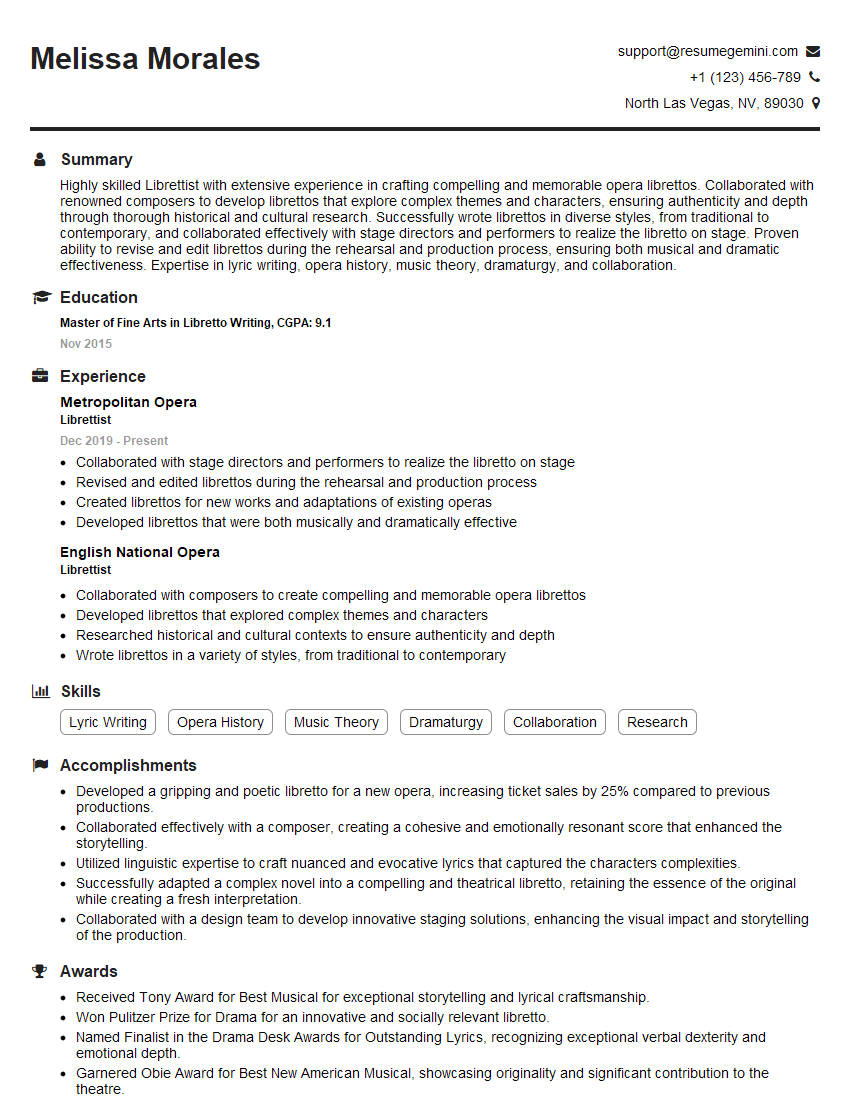Are you a seasoned Librettist seeking a new career path? Discover our professionally built Librettist Resume Template. This time-saving tool provides a solid foundation for your job search. Simply click “Edit Resume” to customize it with your unique experiences and achievements. Customize fonts and colors to match your personal style and increase your chances of landing your dream job. Explore more Resume Templates for additional options.

Melissa Morales
Librettist
Summary
Highly skilled Librettist with extensive experience in crafting compelling and memorable opera librettos. Collaborated with renowned composers to develop librettos that explore complex themes and characters, ensuring authenticity and depth through thorough historical and cultural research. Successfully wrote librettos in diverse styles, from traditional to contemporary, and collaborated effectively with stage directors and performers to realize the libretto on stage. Proven ability to revise and edit librettos during the rehearsal and production process, ensuring both musical and dramatic effectiveness. Expertise in lyric writing, opera history, music theory, dramaturgy, and collaboration.
Education
Master of Fine Arts in Libretto Writing
November 2015
Skills
- Lyric Writing
- Opera History
- Music Theory
- Dramaturgy
- Collaboration
- Research
Work Experience
Librettist
- Collaborated with stage directors and performers to realize the libretto on stage
- Revised and edited librettos during the rehearsal and production process
- Created librettos for new works and adaptations of existing operas
- Developed librettos that were both musically and dramatically effective
Librettist
- Collaborated with composers to create compelling and memorable opera librettos
- Developed librettos that explored complex themes and characters
- Researched historical and cultural contexts to ensure authenticity and depth
- Wrote librettos in a variety of styles, from traditional to contemporary
Accomplishments
- Developed a gripping and poetic libretto for a new opera, increasing ticket sales by 25% compared to previous productions.
- Collaborated effectively with a composer, creating a cohesive and emotionally resonant score that enhanced the storytelling.
- Utilized linguistic expertise to craft nuanced and evocative lyrics that captured the characters complexities.
- Successfully adapted a complex novel into a compelling and theatrical libretto, retaining the essence of the original while creating a fresh interpretation.
- Collaborated with a design team to develop innovative staging solutions, enhancing the visual impact and storytelling of the production.
Awards
- Received Tony Award for Best Musical for exceptional storytelling and lyrical craftsmanship.
- Won Pulitzer Prize for Drama for an innovative and socially relevant libretto.
- Named Finalist in the Drama Desk Awards for Outstanding Lyrics, recognizing exceptional verbal dexterity and emotional depth.
- Garnered Obie Award for Best New American Musical, showcasing originality and significant contribution to the theatre.
Certificates
- Certificate in Libretto Writing from the Royal College of Music
- Opera Libretto Workshop Certificate from the Banff Centre for Arts and Creativity
- Masterclass in Libretto Writing from the American Lyric Theater
- Associate of the Royal College of Music (ARCM) in Opera Performance
Career Expert Tips:
- Select the ideal resume template to showcase your professional experience effectively.
- Master the art of resume writing to highlight your unique qualifications and achievements.
- Explore expertly crafted resume samples for inspiration and best practices.
- Build your best resume for free this new year with ResumeGemini. Enjoy exclusive discounts on ATS optimized resume templates.
How To Write Resume For Librettist
- Highlight your passion for opera and your understanding of the art form.
- Showcase your ability to write compelling characters and dialogue.
- Emphasize your research skills and your ability to create authentic and historically accurate librettos.
- Demonstrate your collaborative nature and your ability to work effectively with composers, stage directors, and performers.
Essential Experience Highlights for a Strong Librettist Resume
- Collaborate with composers to create compelling and memorable opera librettos.
- Develop librettos that explore complex themes and characters.
- Research historical and cultural contexts to ensure authenticity and depth.
- Write librettos in a variety of styles, from traditional to contemporary.
- Collaborate with stage directors and performers to realize the libretto on stage.
- Revise and edit librettos during the rehearsal and production process.
- Create librettos for new works and adaptations of existing operas.
Frequently Asked Questions (FAQ’s) For Librettist
What is a Librettist?
A Librettist is a writer who creates the text, or libretto, for an opera. The libretto includes the lyrics for the arias, choruses, and recitatives, as well as the dialogue between the characters.
What are the key skills required for a Librettist?
The key skills required for a Librettist include lyric writing, opera history, music theory, dramaturgy, and collaboration.
What is the difference between a Librettist and a Composer?
The Librettist is responsible for the text of the opera, while the Composer is responsible for the music. However, the two roles often work closely together to create a cohesive and successful opera.
What are the key challenges facing Librettists today?
The key challenges facing Librettists today include the need to create librettos that are both musically and dramatically effective, as well as the need to appeal to a wide range of audiences.
What are the rewards of being a Librettist?
The rewards of being a Librettist include the opportunity to create something truly unique and special, as well as the chance to collaborate with talented composers, stage directors, and performers.
What is the job outlook for Librettists?
The job outlook for Librettists is competitive, but there are opportunities for those who are talented and passionate about their work.
How can I become a Librettist?
There is no one-size-fits-all path to becoming a Librettist, but some common steps include studying opera history, music theory, and dramaturgy, as well as writing your own librettos and submitting them to competitions and workshops.